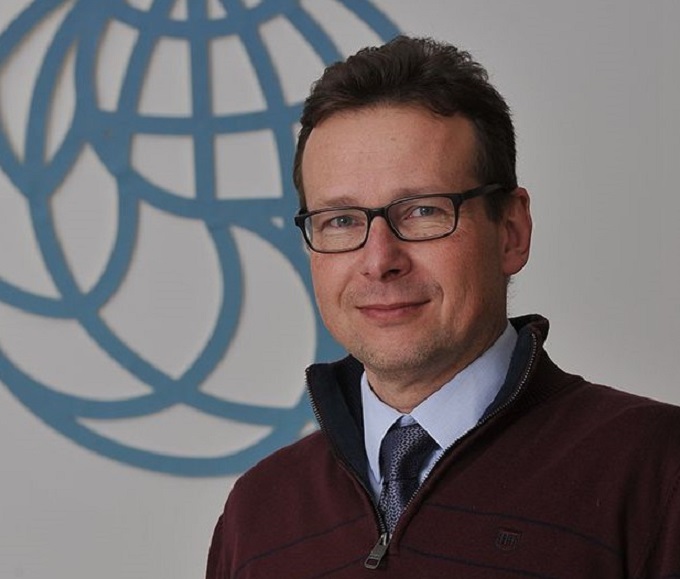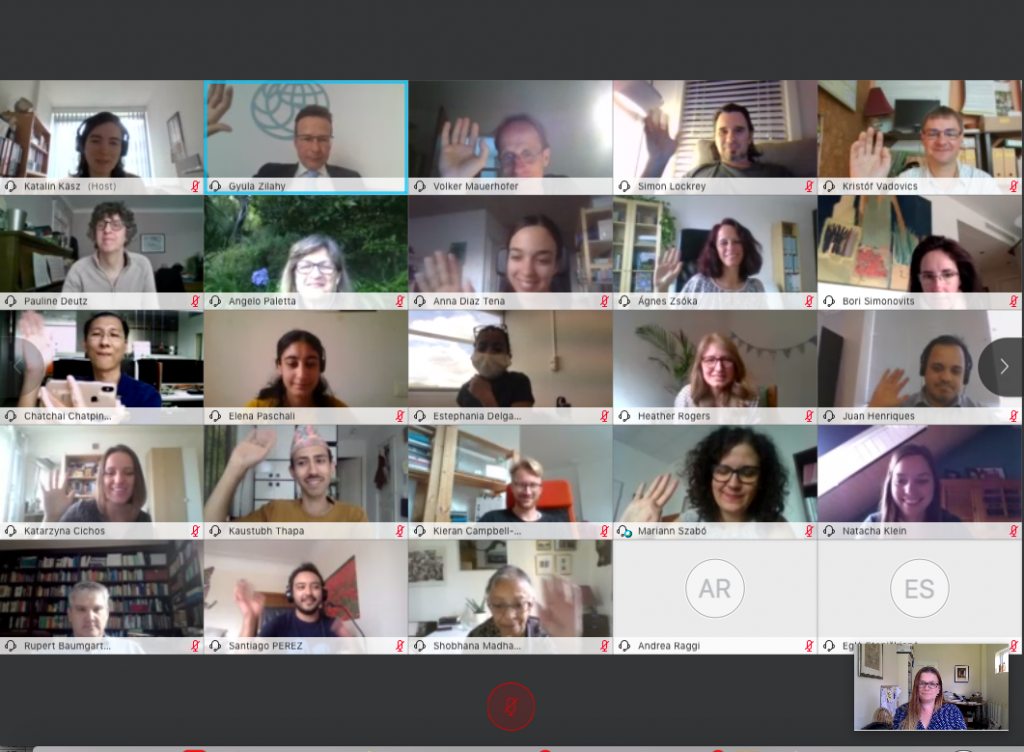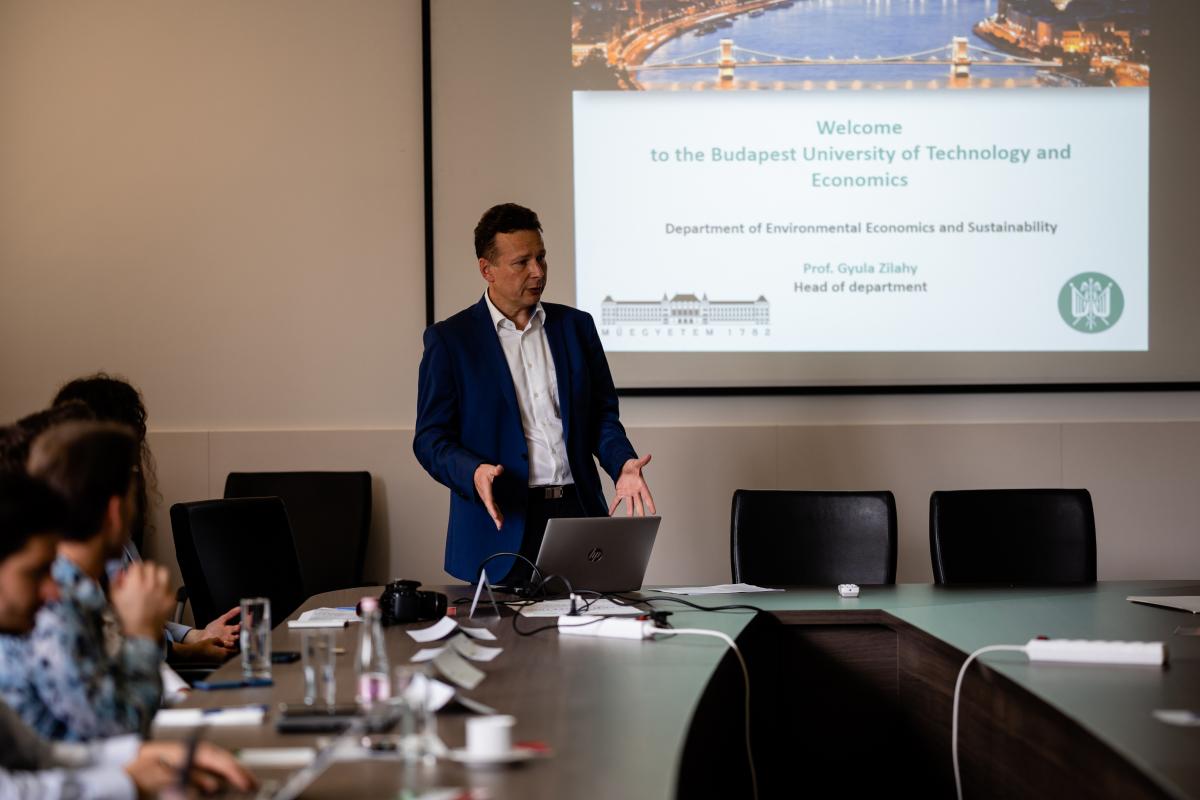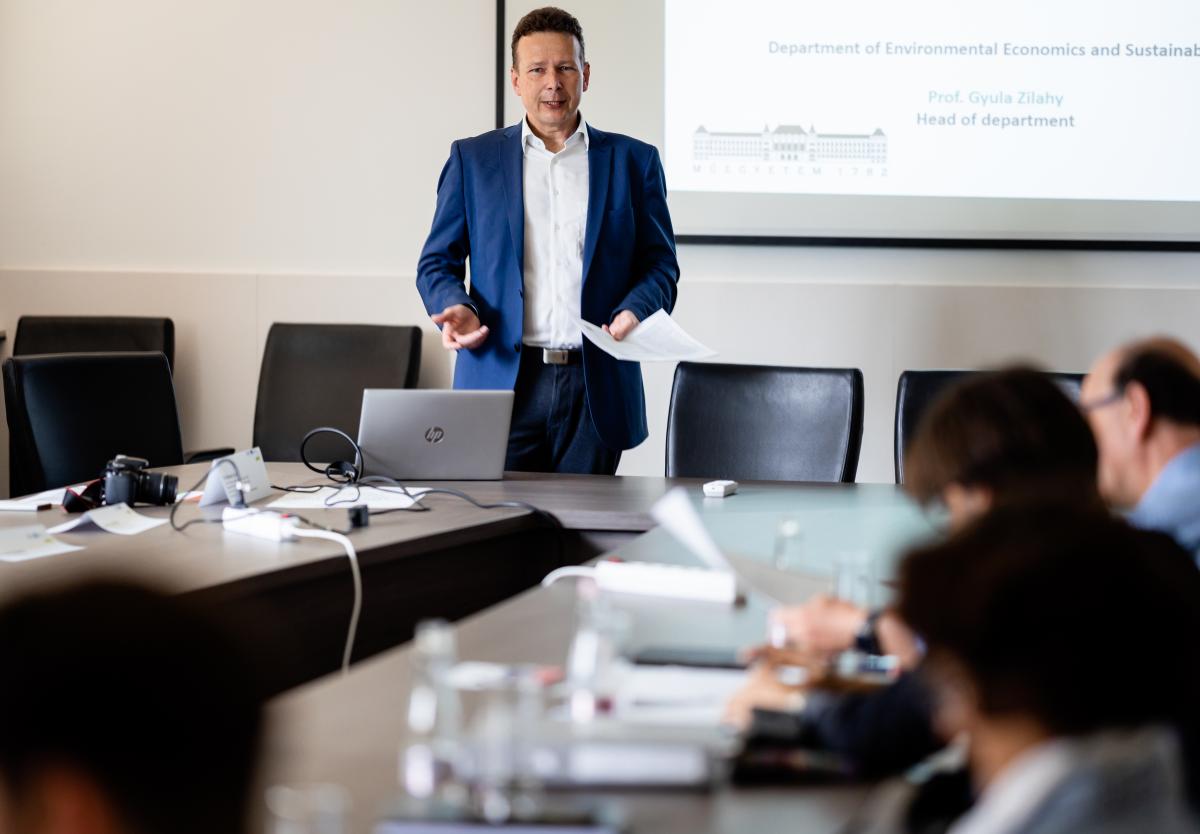News feed
No quality education is possible without research and international collaboration
2023. 11. 28.Participation in international research projects is essential for quality education, says Gyula Zilahy, professor of BME’s Department of Environmental Economics and Sustainability.
Gyula Zilahy, professor of BME’s Department of Environmental Economics and Sustainability, has been working as vice president of the International Sustainable Development Research Society (ISDRS), the global network of sustainable development professionals, since the end of last year. As environmental protection is a global issue and the research projects are international, participation in them is indispensable to ensure that the related disciplines are taught on a high level. We discussed the international collaboration activities of the Department of Environmental Economics and Sustainability of BME’s Faculty of Economic and Social Sciences in the context of sustainability, which has been in the centre of attention for nearly forty years.

You have been the vice president of the International Sustainable Development Research Society (ISDRS) since last year. What are the goals of ISDRS and what is your role within the organisation?
ISDRS is a global network of professionals who study the different areas of sustainable development. It aims to promote the exchange of research results and facilitate cooperation in research. Therefore we do not intend to directly influence decisions but our members who work for higher education institutions and research institutes as well as consultants support the decisions of a variety of entities (e.g. businesses, governments, civil organisations) and have an impact on the society in general. We do not have our own research projects, but we provide a diverse platform where different disciplines and research fields work together. What sets ISDRS apart from the many other scientific organisations focusing on sustainability is that we are not specialised, we try to cover all the areas or, if possible, even connect them and facilitate truly interdisciplinary research. We are a global organisation with members from, beyond Europe: South America through Africa to Asia, which makes the organisation of online events really difficult as at any given time it is certainly nighttime in one part of the world.
As vice president, my primary responsibility is the organisation of annual conferences for a community of several thousand members together with the professional supervision of these conferences to ensure their high quality while I am also increasingly focused on encouraging activities between the annual conferences. ISDRS was established 30 years ago, during which time the world has fundamentally changed. As scientific organisations also need renewal from time to time, we want to start a dialogue within our professional community asking our members what sustainable development means in today’s societies that are transforming in many ways. The concept of sustainable development has entered the mainstream since the 1980s, but we are witnessing many phenomena that did not exist then, such as the growth of mobile phones and the use of artificial intelligence. For this reason, a new approach is necessary as it is not sufficient to slow down or stop destruction, we need to rebuild what we demolished. In other words, we need to achieve regenerative development. For example, huge areas were paved with concrete in Budapest’s metropolitan area, a large part of which was most likely unnecessary. I am absolutely certain that Hungary in the 2020s does not need to take any more land from the natural ecosystems.

BME is an active founder of the European Engineering Learning Innovation and Science Alliance, i.e. EELISA. How important is sustainability for this initiative?
EELISA is special in the way that it establishes communities based on different topics. BME announced a call in relation with the establishment of new communities. My proposal aimed at connecting young researchers studying various aspects of sustainability in a number of universities within EELISA. Sustainability frequently requires an interdisciplinary approach and this is an enormous challenge already at the beginning of the organisation phase as such collaboration between professionals from social sciences, engineering and the field of art, is quite new. At present, the participants in the initiative called Young Researchers for Interdisciplinary Sustainability Science (YRIS) include BME and universities from Bucharest and Madrid. Our experience from all these three institutions suggests that there is still enormous potential in the cooperation of experts from social sciences, engineering and natural sciences.
In June, the project hosted a hybrid conference for doctoral students and young researchers where they presented their research fields and discussed their results. Each presenter was invited to look beyond their own field of interest and think about how to expand their topic to integrate other disciplines as well.
It is interesting that in Bucharest the technology faculties and the economics faculty responded to our invitation separately and they started to discuss the topic and the possibilities for cooperation only later. Madrid offered an even more peculiar situation: we met product designers who want to represent sustainability in the design of products. It is a unique meeting point for art, technology and social sciences.
The discussions about cooperation led to the identification of a large number of issues with regard to the interdisciplinary aspects of sustainability. These are not always related to the different approach we take to solve problems but can be administrative obstacles as well: for example, a doctoral thesis addressing design is difficult to interpret from the perspective of technology or social sciences. Consequently, the project aims to help participants understand each other’s way of thinking and remove these obstacles, which is a long but, for the sake of sustainable development, indispensable process.

What role do you think universities play in the context of sustainability?
The concept of sustainable development started to become widely known in the science community in the 1980s. Earlier, universities had only small, hidden departments dedicated to environmental issues. My career in education and research began exactly 30 years ago and I have been working in the field of environmental protection ever since then. In the beginning, international cooperation was difficult because of the lack of experience but as most of the problems associated with sustainable development cannot be successfully addressed inside one country, this field very quickly became international. Sustainable development affects nearly all the aspects of our lives and all people regardless of their field of expertise can join the discussion about sustainability. In addition to research, universities play a key role in influencing the attitudes of future generations. However, I am afraid that teaching the right attitudes is no longer enough to solve the problems; we, including my generation, have wasted too much time. Many people see education as a last resort: if we can show the problems to young people in an authentic way and help them find the solutions, they might be able to make the changes previous generations were not able to. The role of universities is crucial but I hasten to add that elementary and secondary schools are just as important. Both parents and children express the need that sustainability should be integrated in education from kindergarten until the end of secondary school but most teachers in Hungary lack the required competence and there are no proven methods on how this field could be integrated in education. This is the reason why our department is currently working together with the Department of Technical Education at the Faculty of Economic and Social Sciences in order to develop a specific teacher training programme.
Research and education: can universities have one without the other?
Why do we need to do research in addition to education? The answer is very simple: without research we cannot teach the most recent results. Our knowledge about sustainability, a rapidly developing area, is constantly growing, the curriculum may become outdated in only one or two years. Those who fail to do research and fail to have up-to-date competence are unable to transfer the required knowledge to students. And due to the international nature of this field, research is impossible without international relations and projects.

What international project are you currently involved in addition to EELISA?
One of the most important EU project of our department and faculty is NiCE („Niche to Centre - City Centres as Places of Circular Lifestyles”), which focuses on a fundamental aspect of sustainable development, the achievement of the circular economy. This project is implemented under the EU’s INTERREG programme with the participation of eight countries in total ( https://www.bme.hu/hirek/20230607/Kezdetet_vette_nyolc_orszag_kozos_Int…). This project addresses a topic that can be integrated in the curriculum in university education. Such projects are essential because no department can be successful without professional relations as these allow us to learn new ideas, to discuss these new ideas and to participate in the international dialogue in general. Cooperation is also important because many sustainability issues such as climate change and the condition of natural ecosystems need to be very urgently addressed. If we fail to make radical changes in our lifestyles in the next 6 to 8 years, we are going to fight for our survival not for sustainability.
As a researcher and professor, are you hopeful that our environment can be saved?
I am hopeful but if we do not close our eyes and see the quick degradation of natural ecosystems, it is hard to remain positive. This topic is clearly attracting much more attention today than it did 10 or 20 years ago and besides the loud communication major environmental investments are also taking place. However, they can not be successful on their own and besides governments and businesses us, consumers should also do our best to change our lifestyles.
KJ
photo: Geberle B.
